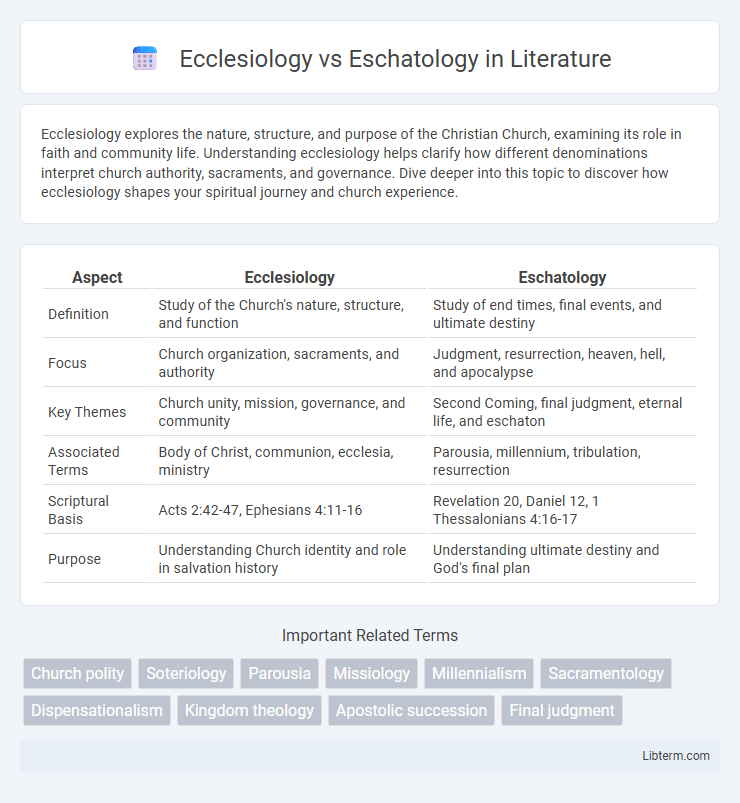Ecclesiology explores the nature, structure, and purpose of the Christian Church, examining its role in faith and community life. Understanding ecclesiology helps clarify how different denominations interpret church authority, sacraments, and governance. Dive deeper into this topic to discover how ecclesiology shapes your spiritual journey and church experience.
Table of Comparison
| Aspect | Ecclesiology | Eschatology |
|---|---|---|
| Definition | Study of the Church's nature, structure, and function | Study of end times, final events, and ultimate destiny |
| Focus | Church organization, sacraments, and authority | Judgment, resurrection, heaven, hell, and apocalypse |
| Key Themes | Church unity, mission, governance, and community | Second Coming, final judgment, eternal life, and eschaton |
| Associated Terms | Body of Christ, communion, ecclesia, ministry | Parousia, millennium, tribulation, resurrection |
| Scriptural Basis | Acts 2:42-47, Ephesians 4:11-16 | Revelation 20, Daniel 12, 1 Thessalonians 4:16-17 |
| Purpose | Understanding Church identity and role in salvation history | Understanding ultimate destiny and God's final plan |
Defining Ecclesiology: The Study of the Church
Ecclesiology is the theological study of the church, focusing on its origin, structure, authority, and purpose within Christian doctrine. It examines key concepts such as the nature of the church as the body of Christ, the role of sacraments, church governance, and the mission of the community of believers. This discipline contrasts with eschatology, which centers on the study of end times and the final destiny of humanity, highlighting the church's ongoing role in God's redemptive plan.
Understanding Eschatology: The Study of Last Things
Eschatology, the theological study of last things, emphasizes final events such as the apocalypse, judgment, resurrection, and the ultimate destiny of humanity. It contrasts with Ecclesiology, which focuses on the nature, structure, and function of the Church as the body of Christ. Understanding eschatology provides critical insight into Christian hope and ethical imperatives concerning salvation, the afterlife, and the fulfillment of divine promises.
Key Differences Between Ecclesiology and Eschatology
Ecclesiology studies the nature, structure, and function of the Christian Church, emphasizing its role as the community of believers and its sacraments, governance, and worship practices. Eschatology focuses on the final events of history, including the second coming of Christ, the resurrection of the dead, judgment, heaven, and hell, addressing ultimate destiny and the fulfillment of God's kingdom. While ecclesiology concerns the present life and mission of the Church, eschatology deals with future realities and the culmination of God's redemptive plan.
Historical Development of Ecclesiology
The historical development of ecclesiology traces its roots to early Church councils such as Nicaea (325 AD) and Chalcedon (451 AD), which defined the Church's nature, authority, and unity in response to theological disputes. Medieval ecclesiology emphasized the Church's hierarchical structure, sacramental role, and its relationship to salvation through canon law and papal authority. The Reformation era introduced significant shifts, highlighting the priesthood of all believers and challenges to institutional doctrines, thus reshaping ecclesiology amidst the rise of Protestant denominations.
Historical Roots of Eschatological Thought
Eschatology traces its historical roots to Jewish apocalyptic literature, influencing early Christian thought on the end times and the final judgment. Ecclesiology, centered on the nature and structure of the Church, developed alongside eschatological expectations, shaping doctrines on the Church as the eschatological community. The interplay between eschatological visions and ecclesiological frameworks is evident in the New Testament and early Church Fathers' writings, reflecting a dynamic relationship in Christian theology.
Major Theological Debates in Ecclesiology
Ecclesiology involves the study of the church's nature, structure, and authority, sparking major theological debates over apostolic succession, the role of sacraments, and ecclesial governance between Catholic, Orthodox, and Protestant traditions. These debates contrast with eschatology, which centers on end-times doctrines such as the second coming of Christ, resurrection, and final judgment. Key ecclesiological disputes address whether the church is a visible hierarchical institution or a spiritual community, shaping diverse interpretations of Christian identity and authority.
Central Eschatological Themes in Christian Doctrine
Central eschatological themes in Christian doctrine emphasize the second coming of Christ, the resurrection of the dead, final judgment, and the establishment of the eternal kingdom of God. Ecclesiology, while concerned with the nature and mission of the Church, intersects with eschatology by highlighting the Church's role as the inaugurated kingdom and its anticipation of Christ's return. The tension between the "already" and "not yet" aspects of God's kingdom forms a critical dialogue between these theological disciplines, shaping Christian hope and practice.
The Interconnection Between Ecclesiology and Eschatology
Ecclesiology and eschatology are deeply interconnected, as the study of the church (ecclesiology) inherently involves understanding its ultimate purpose and destiny, which is revealed through eschatological teachings. The church is often viewed as the inaugurated kingdom of God, embodying the present reality of the eschaton where believers await the full consummation of God's plan at Christ's second coming. The mission, structure, and identity of the church are thus framed by eschatological hope, motivating ethical living and ecclesial unity in anticipation of the final fulfillment of God's kingdom.
Impact on Christian Life and Practice
Ecclesiology shapes Christian life through understanding the church's nature, authority, and communal worship, emphasizing obedience to Christ's teachings and active participation in sacraments. Eschatology influences Christian practice by framing hope and moral urgency based on beliefs about the end times, resurrection, and final judgment, fostering perseverance and ethical living. Together, both doctrines guide believers in embodying faith within the present community and in anticipation of Christ's return.
Contemporary Perspectives and Ongoing Discussions
Contemporary ecclesiology explores the evolving nature of the church in a rapidly changing cultural context, emphasizing community, inclusivity, and digital engagement. Current eschatological discussions focus on diverse interpretations of end-times prophecy, the implications of environmental crises, and the role of hope in Christian theology. Scholars and theologians engage in ongoing debates about how these fields intersect, particularly in shaping faith practices and future-oriented ethics.
Ecclesiology Infographic

 libterm.com
libterm.com